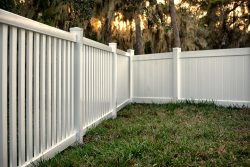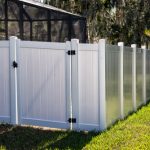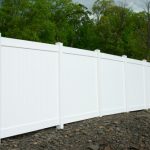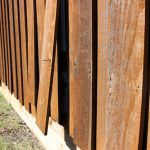What Is The Difference Between A PVC Fencing and Vinyl Fencing?
 What Is The Difference Between A PVC Fencing and Vinyl Fencing?
What Is The Difference Between A PVC Fencing and Vinyl Fencing?
When it comes to choosing a fence for your property, you may be overwhelmed by the variety of options available in the current market. Amongst them, PVC and vinyl fencing are two of the most popular types that are used in both residential and commercial installations. While these two terms are used interchangeably by many people, there is a considerable difference between the two. Therefore, it is essential to know the difference between PVC fencing and vinyl fencing before making a decision about which one to use.
PVC Fencing
PVC stands for Polyvinyl Chloride, which is a synthetic polymer that is composed of ethylene and chlorine. PVC fencing is made from PVC resin combined with other additives like impact modifiers, UV inhibitors, and stabilizers. PVC fence panels are produced by using a die-casting or extrusion process, where the molten PVC resin is molded into the desired shape. PVC fence panels can hold up to different weather conditions, termites, and other environmental factors, so it is an ideal option for fencing systems that require low maintenance.
Vinyl Fencing
Vinyl, on the other hand, is short for polyvinyl chloride or PVC, a form of plastic that has been used since the 1950s for vinyl fencing. Vinyl fencing is made from PVC resin combined with other additives like impact modifiers, UV inhibitors, and stabilizers. The components are mixed and placed under high pressure before being heated, which causes them to fuse together to create a solid panel. Unlike wood, vinyl fencing will not rot, warp, or splinter. The strength of vinyl fencing makes it an ideal option for those who live in areas with high winds or severe weather conditions.
Difference Between PVC and Vinyl Fencing
The biggest difference between PVC and vinyl fencing is quality, strength, and durability. PVC fencing is more durable than vinyl fencing and is less likely to crack, fade, or yellow over time. In comparison, vinyl fencing is more susceptible to fading and yellowing over time, which means it may need to be replaced sooner than PVC fencing. Additionally, PVC fencing can be made to look like natural wood while still retaining its durability and low maintenance qualities.
Another important aspect to consider when looking at the differences between PVC and vinyl fencing is the manufacturing process. PVC fencing is typically manufactured using a die-casting or extrusion process, where the polymer is molded into the desired shape. In comparison, vinyl fencing is manufactured using a process known as co-extrusion, which involves layering the material to create a solid panel. It can also be made using injection molding, making it easier to customize the design of the fence panels.
The weight difference between PVC and vinyl fences also needs to be noted. PVC fences are lighter in weight than vinyl fences, which makes them easier to install and handle but may require more support from posts or other structural features to maintain their shape. Vinyl fences, on the other hand, are heavier and more rigid than PVC fences, which make them more resistant to winds and other environmental factors.
Maintenance of PVC and Vinyl Fencing
Both PVC and vinyl fencing have excellent low-maintenance qualities, making them ideal for those who do not want to spend a lot of time or money on upkeep. PVC fencing is generally easier to clean than vinyl fencing because PVC fences typically have a glossy finish that does not hold dirt as much as vinyl fences. In comparison, vinyl fences tend to have a matte finish that can accumulate more dirt and grime over time. Nevertheless, both types of fencing require occasional rinsing with water and mild cleaning agents to maintain their appearance.
Cost Comparison
Cost is another factor to consider when choosing between PVC and vinyl fencing. PVC fencing is typically less expensive than vinyl fencing, which can make it a good option for those who want a durable and low-maintenance fencing system without breaking the bank. In contrast, vinyl fencing is typically more expensive but often offers a better warranty and increased longevity, which can make it a more cost-effective option for those who plan to keep their fencing system for a long time.
Conclusion
Both PVC and vinyl fencing have their own advantages and disadvantages. PVC fencing is cheaper, looks like natural wood, and requires less maintenance but can be less strong than vinyl fencing. In comparison, vinyl fencing might be a bit more expensive but it offers better strength, durability, and longevity. Ultimately, the choice between PVC and vinyl fencing depends on your budget and needs. However, whichever option you decide, both PVC and vinyl fencing are excellent choices that can add beauty and security to your property for years to come.
Got questions about which fence to go with? Let us help! Contact us today to learn more about what we can do for you!
More...
Categorised in: Fencing
This post was written by admin
 What Is The Difference Between A PVC Fencing and Vinyl Fencing?
What Is The Difference Between A PVC Fencing and Vinyl Fencing?


